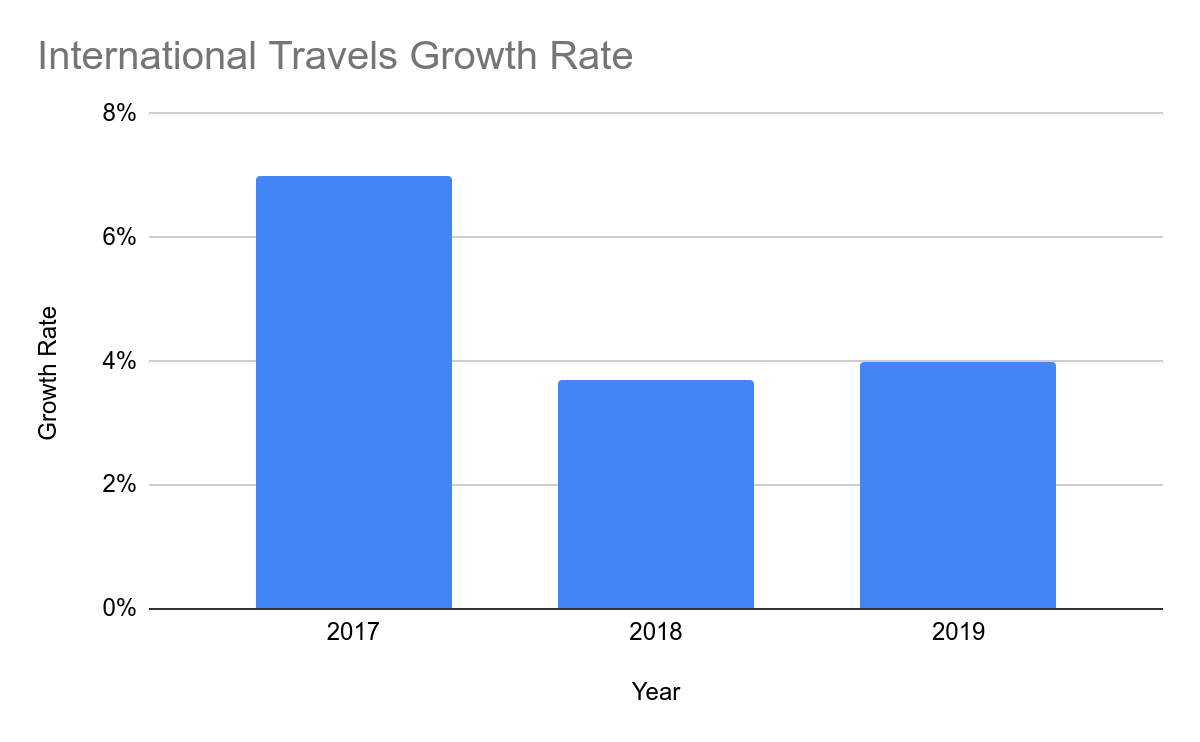Covid-19 Impact On Travel Industry & Factors For Comeback
The year 2020 has been a roller coaster ride for the entire world economy. We have witnessed something never seen before. Covid-19 has impacted every business directly or indirectly. The travel industry was hit the most in light of travel restrictions and a general fear of contracting the disease. According to the UNWTO estimates, International travel dropped to 70% in 2020 and expect a rebound, not before the third quarter of 2021. Travel industry suffered huge losses and faced challenges from every side be it its internal operations, revenue generation or demand & supply.
Travel Industry growth trend before Covid-19
Before Covid-19, the travel industry was growing at a very steady rate. Every year the market capitalization was increasing, international travel was doing very well and there was a lot of buzz around the travel industry’s future. As per UNWTO, the travel industry achieved a steady growth of 4% almost every year till 2019 and the same was expected in 2020. The international arrivals were growing from year to year. If we consider international arrivals for the last 4 years then 2017 had a growth of 7%, 2018 had a growth of 3.7% and 2019 had a growth of 4%. The same growth trend was expected to continue in 2020.

Beginning of Covid-19 impact
Covid-19 made everyone feel helpless. In Dec 2019, there was news about covid-19 in China. No one paid much attention to it. In January 2020, the entire world became aware of it, yet, it was not considered as a serious problem but only regular flu. In February 2020, people started worrying about its destructive powers. In March 2020, world governments realised the severity and started issuing a country-wide lockdown, restricting travel. This was the time when the travel industry saw a declining trend which became worse month over month. Lots of people got stuck for months, travel was restricted, flights/trains were cancelled, hotels and public places were closed. Everyone was inside their home for months.
Factors contributed to travel industry impact
There were lots of factors which directly or indirectly impacted the travel industry during the covid-19 pandemic. Following are the main factors which highly impacted the travel industry.
- Movement restrictions: Movement restrictions imposed by several countries hit the industry hard. All of sudden there were no travellers. Airlines were empty, forced to discontinue their schedule. Hotels were empty, forced to run on bare-bone staff or shut down their operations. No one was moving from one place to another, which resulted in a downtrend in travel industry growth.
- Fear causing the cancellation of existing bookings: During lockdown and post lockdown, people got scared of contracting the virus. People cancelled their planned travels, some cancelled their pre-booked flights and some were forced to cancel, due to government regulations over domestic/international travel. It resulted in the loss of significant revenue.
- Refunds for cancellations and no new bookings: Once people cancelled their flights, hotels bookings refunds had to be made for each cancelled booking. With the revenue drying up and the huge scale of refunds, lots of small businesses went bankrupt.
- Other Factors: There were other factors too that hurt the travel industry like supply chain collaboration, the operational cost of providing a full bandwidth of service, infrastructure cost etc. Yet, these were more of the consequences of the above factors.
What measures the travel industry took to sustain
Covid-19 hit the travel industry very hard. Every business tried to survive in the best way possible, few did and few did not. The industry saw unprecedented cost-cutting actions. Following were the most common actions taken by every business to survive:
- Contract jobs termination and Full or partial layoffs: It’s hard to accept but it’s true, most of the contract jobs were cut directly. All the people working on contract are not treated as regular employees of a business. So the first step companies took was to lay-off all contract-based jobs and save some cost.
Staff salaries are a big part of every business operational expenditure. With no new revenue flowing in for multiple months, businesses had to take extreme measures to secure their viability while securing the maximum number of jobs. At some places, staff were laid off. While at other places, staff members were laid-off partially for a few hours, which resulted in less cost. In some other cases, staff were retained on a temporarily shrunk salary. - No bonus for the entire year: Bonus is treated as an extra incentive given to employees apart from regular salary. Mostly every business declared that no bonuses will be rolled out for 2020. This was not a pain point for employees, as everyone was trying to secure their jobs first. Yet it was a significant factor helping to reduce the cost for business during the pandemic.
- Minimum operations: Businesses, both online and offline reduced their operations to the minimum levels where they could be functional as well as survive. Online businesses reduced their online infrastructure to reduce monthly bills. Flights/trains were reduced or stopped. Hotels/restaurants were partially or fully closed.
- Suspensions of suppliers/vendors or demanding heavy discounts for some time: The travel industry is highly integrated with other industries. They need suppliers and vendors to continue normal services. and to continue essential services at the minimum possible opex, a lot /vendor relations were terminated for an indefinite time to reduce cost. Few vendors gave heavy discounts for some time to keep the business engagement running.
Key factors for the travel industry to bounce back
Everyone is hoping for the travel industry to get back on its track. The travel industry may bounce back early, due to the following key factors:
- Reduced fear brings hopes: With time, most people have started or will start the precautionary measure for COVID-19 more seriously. This will result in reduced fear of travelling and will bring new hopes for the travel industry.
- Attracting travellers with heavy discounts on travel due to no visitors: Without travellers, lots of businesses are struggling to survive. This has created another race between businesses to incentivise travel by giving heavy discounts to attract travellers. Heavy discounts may help in attracting customers and can be a starting point for a new beginning in the new normal.
- Movement Relaxations issued by Government: Almost every government has started to give relaxations in travel movements. People still have an advisory to refrain from movements but they are not officially restricted. Travel made with precautions can help the travel industry to be back on track.
- Reduced COVID-19 cases: After several months of the crisis, lots of countries have seen a downtrend in covid-19 cases. Few countries already have declared them as Covid-19 free countries. In areas, good growth can be expected in the travel industry.
Estimated timeline for the travel industry to recover
Travel industry depends upon lots of factors, but the main factor is the traveller. If there is a traveller then there is a business associated with him. Travel industry recovery is not expected to be fast but it will be slow and eventually recover from all loss.
Business travellers, health tourists and sport tourists will be the first ones to come back to the business. Business travellers are the most frequent travellers and one of the basic customer segments for the travel industry. Domestic travel recovery will come first, followed by international travel. After domestic travel, travel will expand to neighbouring countries and after that open to worldwide.
As per UNWTO panel experts, we can expect the travel industry will see international travels growth from the third quarter of 2021. But to reach the level of 2019 it will take until 2023. Therefore, there are high hopes with 2021 for starting the recovery process of the almost flatlined travel industry.
Travel industry plan moving forward
A yearly forecast is a baseline for the travel industry to plan ahead. The 2020 year was also planned based upon data from 2019. But 2020 has been one such outlier for which none of the forecasts had accounted for. v. Many businesses have decided to ignore the data from 2020 and use 2019 data as a base for 2021 forecast. Using 2019 data may not be ideal but still it will give a much better forecast than 2020 data.
As per UNWTO, the travel industry’s leaders are coming together and forming a standard code of tourist safety. If such a code of conduct, protected by law will be in place for tourists, that will bring more confidence and make people feel safer in international travels. We are not sure if such a standard will be finalized and in action, but seeing such actions shows the commitment of the travel industry to reach its heights back.
Conclusion
Covid-19 impact span will not be small, it will take time to fade away completely, but precautions in business planning can help. Until the travel industry is not fully recovered, most of the businesses in the travel industry will try to plan on a tight budget, with minimum staff and on a minimum operating cost. So that they can survive in the long run and bounce back on track.
Despite the huge impact, the travel industry’s future looks very promising. A huge wave will come in the travel industry due to delayed travels, pending celebrations, delayed sports and business events. Moreover, heavy discounts everywhere compete with each other.



